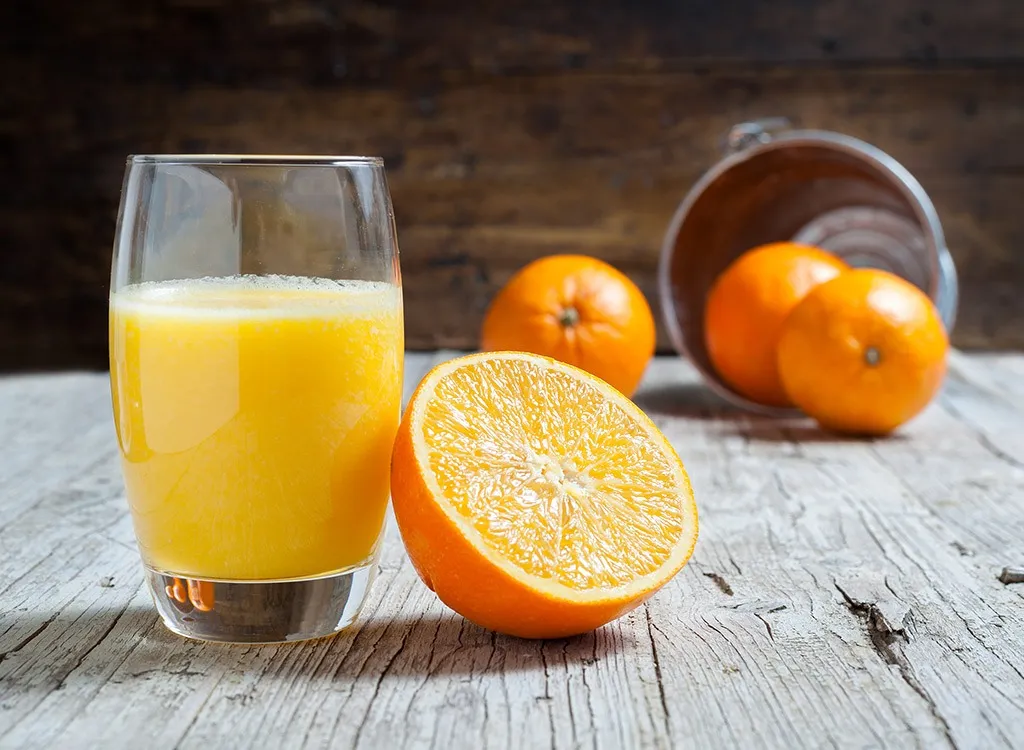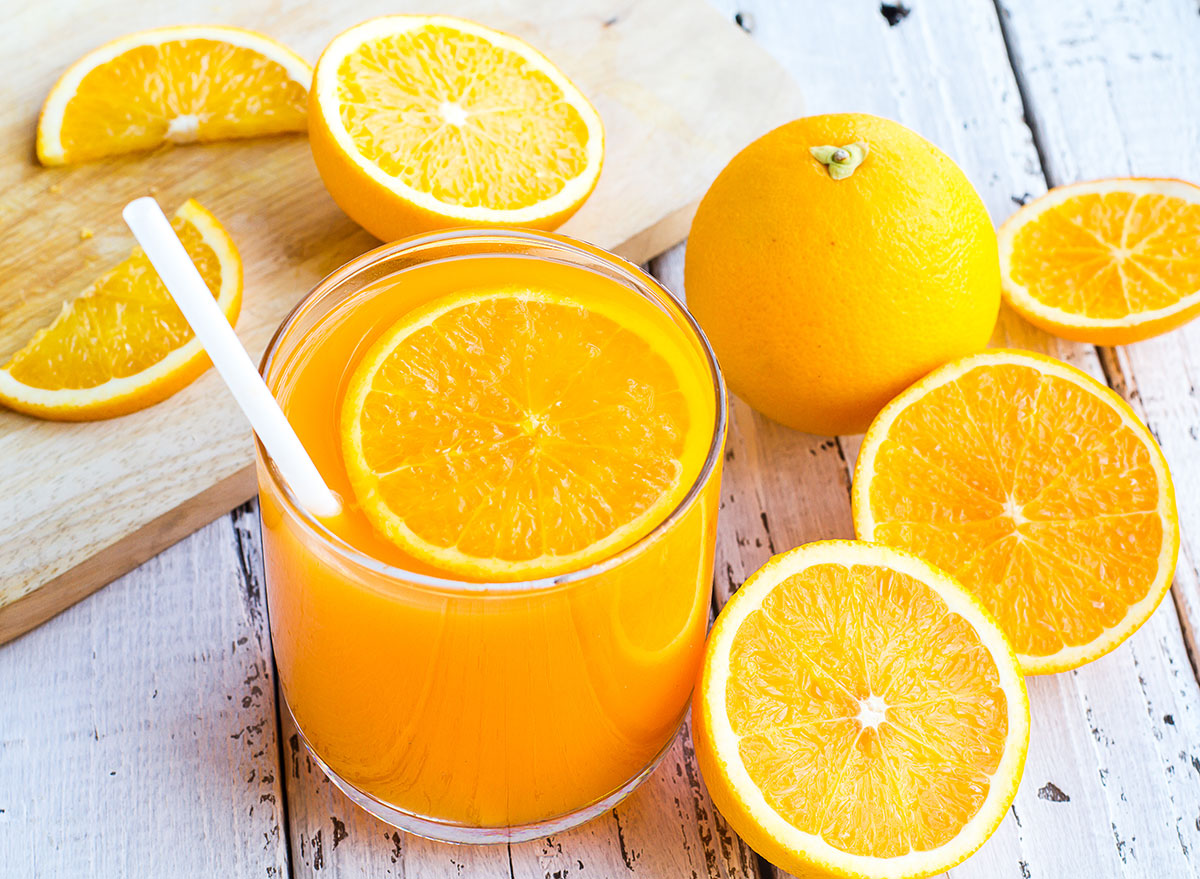Whether you typically start your morning by uncapping a carton of OJ or make your own fresh-squeezed version on weekends, orange juice is a tasty part of many people's breakfast routines. While you may recognize the popular drink as an excellent source of vitamin C—frequently packing more than the recommended daily allowance of the nutrient in every cup—that's not all you're getting with every sip. You may be aware that orange juice is particularly high in sugar—albeit, generally just natural sugar from oranges—which may have you wondering if orange juice is good for you.
Before you pour yourself another glass of this golden elixir, read on to discover some of the benefits along with the potential side effects that can stem from drinking orange juice, according to science.
A look at OJ's nutrition content

"Orange juice may be known for its vitamin C content and as a hydrating beverage that people reach for when they are sick, but this drink is so much more than a vessel for vitamin C," explains Lauren Manaker, MS, RDN, registered dietitian and author of The First Time Mom's Pregnancy Cookbook and Fueling Male Fertility. "It contains other key nutrients, including folate and potassium. Plus, it contains a unique plant compound called hesperidin, which may help support healthy blood pressure and other positive heart health outcomes."
According to the USDA, when you're drinking 1 cup of standard, 100% juice orange juice sans pulp, you're nourishing your body with:
- 110 calories
- 26 grams of carbs
- 23 grams of sugar
- 0 grams of fiber
- 2 grams of protein
- 72 milligrams of vitamin C (120% DV)
- 0.12 milligrams of vitamin B6 (6% DV)
- 14.4 milligrams of calcium (2% DV)
Is orange juice good for you?
Though orange juice is primarily comprised of nutrient-dense fruit, not all juices are created equally—especially if considering the variety of mass-manufactured juice brands currently lining the aisles of local grocery stores.
Manaker claims that "100% orange juice can absolutely be a part of a balanced and healthy diet."
While some brands of store-bought orange juice are comprised of quality ingredients and 100% orange juice contains no added sugars at all, others can be riddled with added sugars on top of the already high concentration of natural sugars. In turn, this can really up the calorie count of your OJ.
"[Orange juice] does contain a source of carbohydrates in the form of sugar; however, [100% orange juice] does not contain added sugars—and you can buy it with pulp for a small boost in fiber," explains Caroline Thomason, RD, CDCES, a northern Virginia-based dietitian.
The key to finding the best orange juice that will serve your body well? Pay attention to all the labels and read the nutrition info. According to Manaker, you should also "opt for a beverage that is made with 100% juice, and not an orange 'drink' that is made with added sugars."
"Look for labels that say 'no added sugar' or 'with pulp' for the most nutritious option," says Thomason. "You can also find options with half the sugar if you are carb-conscious. For example, Simply Light Orange Juice makes a great low-sugar option."
For a healthy approach to incorporating orange juice into your diet, Thomason suggests that you "consider how much total juice you consume in a day, and balance your OJ with protein, fiber, and healthy fat to feel full and satisfied."
8 benefits of drinking orange juice—and 1 negative side effect
Orange juice can help reduce your risk of stroke.

"Data shows that consumption of orange juice is linked to a 22% decreased risk of ischemic stroke in men, and a 19% decreased risk of ischemic stroke in women," says Manaker.
OJ may combat kidney stones.

"Drinking orange juice has been scientifically linked to helping prevent kidney stones," says Caroline Young, MS, RD, LD, RYT, owner of Whole Self Nutrition. In fact, a study published in the Clinical Journal of the American Society of Nephrology assessing nearly 200,000 participants observed that "consumption of coffee, tea, beer, wine, and orange juice is associated with a lower risk" of kidney stone development.
Orange juice may reduce inflammation in your body.

Inflammation can wreak havoc on practically every body part from head to toe, but adding a little orange juice to your regular routine could help head it off at the pass. As Manaker aptly points out, "Orange juice intake had beneficial impacts on various markers of oxidative stress and inflammation."
A 2012 study published in The American Journal of Clinical Nutrition found that non-obese adults with increased cardiovascular risk who received 500 mL of orange juice over a 12-week period had lower inflammation at the end of the study than those given the same portion of a placebo drink.
Orange juice may aid in weight management.

While fruit juice may have a bad reputation when it comes to weight gain, some studies suggest that individuals who regularly consume orange juice may be less predisposed to weight-related conditions like obesity than those who abstain.
A 2012 study published in BMC Nutrition Journal found that individuals who regularly consumed orange juice not only had a better overall diet quality, but a lower risk of obesity, as well.
"As long as there are no added sugars and the juice is made with real oranges, it can be a healthy addition to a balanced diet," advises Manaker.
Orange juice might contribute to weight gain.

Some brands of orange juice are higher in sugar and carbs. For people who need to gain weight, this could be considered a plus. Thomason notes that "people who need to gain weight or who may have lost their appetite, juice is a great way to increase calories without feeling overly full."
However, the downside to this is if you're hoping to lose weight, too much OJ might impose on your ideal timeline for hitting your weight loss goals, especially if you're not drinking 100% orange juice.
OJ counts toward your recommended daily fruit inake.

"[Drinking] 100% orange juice can help people meet their recommended intake of fruit, as most Americans are missing the mark in that department," says Manaker.
Citing the 2020–2025 Dietary Guidelines for Americans, the CDC advises that adults should aim to eat (or in this case, drink) around "1.5–2 cup-equivalents of fruits and 2–3 cup-equivalents of vegetables daily."
It might help lower your cholesterol.

If you're dealing with high cholesterol, adding some orange juice to your regular routine may help get those numbers into healthier territory.
According to a study published in the Journal of Agricultural and Food Chemistry, individuals who consumed 236 mL of not-from-concentrate orange juice over a three-week period saw reductions in their LDL to HDL cholesterol ratio. Yet another study published in Alternative Therapies in Health and Medicine found that citrus flavonoids, like those found in orange juice, were effective at lowering both total cholesterol and LDL cholesterol in individuals with high cholesterol.
Orange juice may improve your immune system.

If you're trying to give your immune system a boost, vitamin C-rich orange juice might just be the answer you're looking for.
A 2021 study published in Frontiers in Immunology found that regular consumption of orange juice was effective at reducing inflammation, which may benefit consumers' overall immune health.
It can lower your blood pressure.

Approximately 45% of U.S. adults have high blood pressure—and if you number among them, adding some orange juice to your regular routine may be able to help.
A 2021 study published in the European Journal of Nutrition found that among a group of 159 people who drank either a control drink, orange juice, or orange juice enhanced with hesperidin (a polyphenol found in oranges), over 12 weeks, those who received either the regular or enhanced orange juice saw reductions in their systolic blood pressure and pulse pressure.
No comments:
Post a Comment